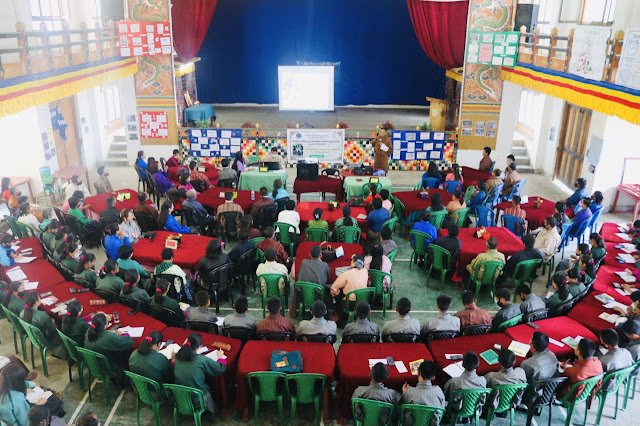30th August 2021
Delivered
by: Principal
Dechentsemo Central School, Punakha
Dashos,
RIGSS faculty, senior principals and mates,
It is
my assumption which will be painful to hear, but I have begun to believe that
the long cry on declining quality of education and the denial by education
fraternity for a long time has been wrong. It has also been wrong perhaps, to
defend we were doing enough in our schools when today we realise how much we
could have done and how far behind we are even in our leadership and knowledge.
Experiences have rather limited us from leading the way children need to be
learn by.
It is
embarrassing to me at least, that His Majesty the King has to pronounce for
education reform. I take it as a caution upon myself, that it is a decree for
me to transform myself first before reform can take place in the school. It is
even more embarrassing that His Majesty the King has reminded several times,
the need to have ‘Just and harmonious’ society, yet we believed we were doing
well. It was in fact a higher call for change in how we serve the nation we
promised to serve when we began our career.
We
may be expressing our opinions like we are experts at leadership, but we may
have been principals to whose office teacher do not feel like home to enter. We
may have been a teacher, deluded to believe that we are the best, when the best
service has not contributed to fulfil the vision of our schools!
Further,
how many times His Majesty has displayed moments of transcendental examples and
sacrifices to awaken our consciousness, but we remained unchanged, refusing to
be inspired to perform. If our beloved king walking the plains and hills, the
valleys and towns in summer heat and monsoon rain, do not shatter our
arrogance, what will make us study and work better than what we do? If our king
serving his lunch under a shed in the southern forest and scaling mountain
trail, trekking peaks and navigating leech infested jungles, does not rouse us
from idleness, what will make us guilty enough to rise and serve better? How
many sublime quotes of our kings will we frame on walls and quote in our
speeches but never change in what we are and how we do for the nation we serve?
Do we
only boast of our ages and experience and talk of limitations? This SLDP opportunity
makes us obliged to reflect and revisit our strengths and services towards
enhancing quality leadership and performance. It is not enough, and never too
late, to redesign our leadership, direct our direction and emulate virtues of a
SMART Bhutanese to educate children to become capable leaders. I have no doubt;
our nation will fail if each of us does not grow. It will have to begin by a
book we read, reflection we make, a speech we give, an activity we plan, and
from attitude we begin to change.
We
have come a long way in education history, and it is imperative we must
question how well we have progressed to live the 21st century with
pride. History tells us that modern education began in 1913 with the first
school begun at Gongzim Ugyen Dorji School in Haa and another in Bumthang in
1914. It is today 108 years since the inception of modern education. We have
come from 46 students to 16,800 students today. We pay tribute to the peerless
leadership of our hereditary Kings for their wisdom and foresignt to have given
priority with free educayion for sao many years.
The
future of the nation, of 1,16,800 students, is in the hands of over 500
principals. Today, with the Royal Kasho as a beacon of hope and direction, the
history of education system embarks upon a major reform, and each of us are critical
asset in this venture. The national policies and governing norms will have
little to serve the purpose if school leaders fail to function vibrantly with
ethos parallel to visions enshrined within the Royal Kasho. And this begins
from asking ourselves, who we are, what we are and why we are here today.
When
Director RIGSS, Dasho Chewang Rinzin took us through more than two hours of
Induction and Introduction session, we learnt how we can change ourselves, our
mindset and behaviour as a leader. We are told that from the bed we make to the
coffee cup we drop into the bowl, we learn leadership. I have seen RIGSS
management as an exemplary spectacle since 2014 when I was at Phuentsholing,
and Dasho Chewang Rinzin had always been an inspiration I discreetly learnt
from.
It
has been an incredible journey at Tsirang. The programme sessions tested and
teased our learning, deepened and widened our horizon, brought painful
realisation and poignant awakening. When session stretched into the night, it
challenged the limits of our tolerance and possibilities of learning there is beyond
the conventional hours. I heard from my friends that, not even during their 2
years’ university studies did they learn something like the sessions here.
 |
And I
wish to thank our cooks and everyone behind the blankets who made our
residential stay like second home. Finally, I thank you dear colleagues for your
support in my captain’s role here. I hope I have given you reason to practice
leadership virtues through my small flaws.
Henry Wadsworth, an American poet and educator once
said,
"The
heights by great men reached and kept, were not attained by sudden flight; but
they, while their companions slept, were toiling upward in the night."
Today, as we complete the
training, each of us promise to work and serve better than ever before.
Thank
you.

































